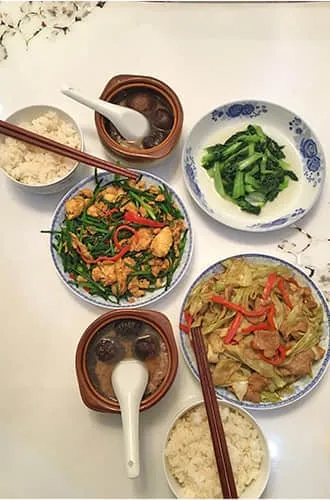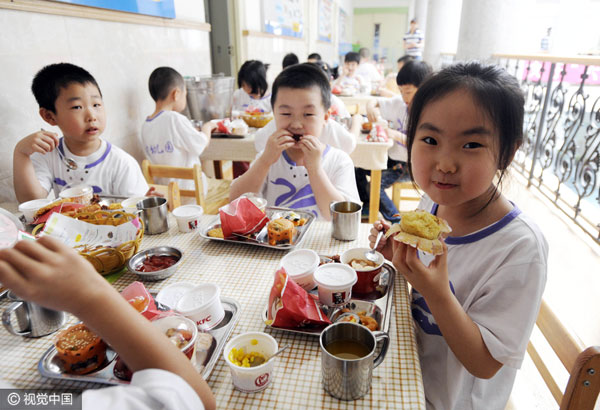20 Free Tips To Chinese Food Culture Guide
Wiki Article
Top 10 Tips For Dealing With copyright Products When Shopping In China
1. Be aware of the risky products: The most frequently counterfeited items are designer clothes bags, watches electronic devices, bags, and electronic gadgets. Be very cautious when shopping for these items.Pro: Aids you to focus your scrutiny on likely fake products.Con: A lack of understanding regarding authentic products can cause suspicion.
2. Get the most authentic information about the productBefore making a purchase, become familiar with details such as the logo, packaging, fabrics, and the stitching of the brand.Pro: Increases your skill in spotting subtle differences between fake and real products.Cons: It can take a long time, particularly when you're not familiar with the products.
3. Trusted StoresTIP: When buying expensive products, stick to official brand stores or reputable malls like Beijing's China World Mall or Shanghai's Plaza 66.Pro: The authenticity of the item is guaranteed, and comes with warranties and receipts.Cons: The costs of items may be much higher than those in small shops or market stalls.
4. Check Labels and TagsBe sure to look for typos, inconsistent fonts, or poor quality materials in packaging and tags.Pro: A simple method of identifying poorly manufactured counterfeits.Con: High-quality counterfeits may appear to be authentic which makes it harder to identify.
5. Beware "Too Good to be True Prices"Tipp: Low prices on expensive items should be a red flag. True luxury items rarely sell much less than the retail price.Pro: Avoids obvious frauds.Con: Some sellers moderately price fakes in order to give them a more convincing appearance.
6. Request Certificates of ValidityTips: When purchasing items such as jade, antiques, products that are branded, you should request documents to prove authenticity.Pros: It gives you an extra layer of confidence.Con: This method can't be relied on because certificates can be faked too.
7. Try before purchasingYou should test high-end electronic devices before making the final decision.Pro Tests the functionality and quality.Con: Sellers won't always allow testing. Tests may also be limited or superficial.
8. Avoid Buying Antiques Without ExpertiseTips: Antiques that are authentic require extensive knowledge or the verification of an expert. Beware of them until you can confirm their authenticity.Pro: Lowers the chance of being scammed with replicas or counterfeits.Con If you don't take the time to take a look, you could be missing out on visually appealing, if not authentic, decorative items.
9. Use an Local Guide That You TrustTip: Consult for a local guide or ask a trusted friend who is familiar with the market to help you identify reputable vendors.Pro: Saves time and minimizes risks when shopping in untested markets.Pros: Some guides could charge a fee or a tip, which will increase the cost of your trip.
10. Trust Your InstinctsYou must leave a vendor if something doesn't feel or feel right. This could be the customer's attitude, or the quality of the item, the price, etc.Pro: Prevents you from making costly purchases that you regret.Be cautious: Being too cautious could cause you to pass on genuine deals.
Benefits of Avoiding Fake GoodsDurability: Genuine goods last longer and offer better value.Peace of Mind: There is no need to be concerned about being deceived or cheated.Legal Safety: Some nations penalize travelers if they bring returned copyright goods.It is essential to support authentic products for maintaining ethical business methods.Cons of Avoiding Fake GoodsGenuine products tend to be more expensive.Limited availability: Genuine goods might not be readily available in markets and smaller shops.False bargains: Some fakes offer high quality and great value for money at a bargain.With these suggestions, you can navigate the shopping experience in China without fear and make educated decisions about buying authentic or imitation products. View the recommended a tour of China regional cuisine for blog tips including uncover China food traditions, journey through China food culture, uncover China food traditions, must-try foods in China, taste your way through China, food guide to China best cities, authentic tastes of China, taste your way through China, taste the best dishes across China, Chinese food culture guide and more.

Top 10 Tips To Visit The Temples Of Fame During Seasonal Visits In China
1. Visit During the Off-Season (Autumn/Winter)Tip: Consider visiting famous temples in China during the off-season (autumn or winter) generally from November to February. This is when fewer tourists are present and the weather tends to be cooler.
Pro: A less crowded experience that is more tranquil and serene.Cons: The weather might be colder than usual, which could make temple tours in the outdoors less enjoyable.2. Be prepared for extreme weatherTips: Temperatures vary dramatically in different seasons. The temperatures can vary greatly across seasons. Make sure you check the weather and pack accordingly.
Pro tip: Be prepared for all weather conditions, and enjoy your trip in comfort.Packing for extreme seasons can be a hassle, particularly if you are travelling in a small amount.3. Visits in the Spring and Summer for Vibrant FloraTip: If you visit temples during the summer and spring You can take in beautiful gardens with flowering plants and lush landscapes.
The grounds of the temple are beautiful to visit.Con: Summers in the US can be extremely hot and packed. This is especially true during the national holidays.4. Think about festivals and other special events.Tip: Plan a visit to the temple during festivals of traditional significance like the Chinese New Year in January/February or the Mid-Autumn Festival in September. These times are filled with festivities, rituals and a chance to experience the temple's vibrant culture activity.
Pro: The temples are often lively and full of traditional activities, giving visitors an experience unlike any other.Con: Temples tend to be very busy and hotel rates can increase during the festival season.5. Avoid the Peak Holiday SeasonsAvoid visiting during busy tourist seasons such as Chinese new year, Golden Week, or the Golden Week of October, where temples can be crowded.
Pro: Peaceful experiences without crowds, giving a more spiritual and peaceful experience.Con: You could not be able to catch some of the special events if in the area during peak times.6. Be sure to check for winter Temple closures.Tips: Some temples might have limited hours or closed during winter's colder months, particularly in more remote regions or northern regions. Make sure you check prior to visiting.
You can avoid unnecessary trips by planning ahead.Con: A lot of temples are either shut or have hours reduced for repairs. This can lead to frustration.7. Early Morning Visits in SummerArrive early to avoid the hot midday sun. Many temples open at dawn, and at this time is peaceful with fewer visitors.
Cons Cons: The crowds aren't as loud, and the temperature is cooler.Con: It requires an early wake-up that is not ideal for all.8. Be Prepared to Rain in the Summer.Tips: Summer may also bring heavy rains, particularly in the southern part of China. If visiting during this season, pack an umbrella or rain gear to ensure you are comfortable.
Pro: You are able to take in the beauty of the temple even in the rain.Con: Rain could disrupt outdoor activities and make temple grounds slippery.9. Visit temples in the mountains in the fall.The fall foliage provides a stunning picture and is the ideal time to visit mountains (e.g. Mount Wutai).
Pros Cons: The cooler temperatures are perfect to hike and explore nature.Con: The popular mountain temples are still popular with tourists, especially during weekends or holidays.10. Take a look at the Lunar Calendar for Specific EventsTip - Many temples in China make use of the lunar calendar. Certain events and rituals are also linked to specific lunar dates. The calendar can be used to plan your trip and attend important events like the Lantern Festival or Buddha's birthday.
Pros: More in-depth understanding of religious practices and the unique cultural experiences.Cons Cons: The lunar calendar could make you plan your trip with more care and might not coincide with the events happening at the time.Pros of Seasonal Visits to Chinese TemplesLess crowds during off-season trips offer a tranquil and reflective experience.Cultural Events: Festivals offer the opportunity to experience more the local cultural and religious traditions.Scenic Beauty. The seasons of spring and autumn can bring you stunning landscapes. The lush gardens that surround temples can also be a good option.Cooler weather: The autumn and the winter are the best times to visit temples.Pros and Cons of Visiting Chinese Temples during the SeasonUnpredictable Weather: Winter could be cold and summer may be hot, which can affect your well-being.Temple Closures: Certain temples may have limited hours or be closed during the off-season or extreme weather months.People are crowded at festivals: The most popular events can attract large numbers of people, making it difficult for you to fully appreciate the temple’s peaceful environment.Limited Events: If you're visiting outside the season, some seasonal events might not be held.If you plan your visit according to the season you will have an unforgettable and enjoyable experience. Whether you're looking for peaceful peace or a cultural celebration Understanding the changing seasons can help you make the most out of your trip. View the top rated a tour of China regional cuisine for website examples including delicious Chinese dishes to try, delicious Chinese dishes to try, a tour of China regional cuisine, famous foods in China cities, regional Chinese cuisine highlights, taste the best dishes across China, taste your way through China, Chinese cuisine you need to try, from street food to fine dining in China, China famous food destinations and more.
